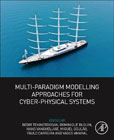
Multi-Paradigm Modelling Approaches for Cyber-Physical Systems
Tekinerdogan, Bedir
Blouin, Dominique
Vangheluwe, Hans
Goulão, Miguel
Carreira, Paulo
Amaral, Vasco
Truly complex, engineered systems, known as Cyber Physical Systems (CPS), are emerging to integrate physical, software, and network domains. To date, no unifying theory, systematic design methods, techniques or tools exist for such systems. Individual (mechanical, electrical, network or software) engineering disciplines offer only partial solutions. Multi-paradigm Modelling (MPM) proposes to model every aspect of these complex systems, at the most appropriate level(s) of abstraction and using the most appropriate modelling formalism(s). Modelling language engineering, including model transformation, and the study of their semantics, are used to realize MPM, which is seen as an effective answer to the challenges of designing Cyber Physical Systems. Multi-Paradigm Modelling for Cyber-Physical Systems will explore modelling and analysis as crucial activities in the development of Cyber-Physical Systems, which are inherently cross-disciplinary in nature and require distinct modelling techniques related to different disciplines, as well as a common background knowledge bridge to enable communication between all specialties. The book will serve as a reference for anyone starting in the field of CPS who will need a solid foundation of modelling CPS and a comprehensive introduction to the distinct existing techniques, with clear explanations of their advantages and limitations. Although most of these techniques are already used as a matter of common practice in certain disciplines, the knowledge of their fundamentals and applications is typically unfamiliar to practitioners of another area. The net result is the tendency for CPS practitioners to use the technique that they are most comfortable with, disregarding the technique that would be the most adequate for the problem and modelling goal. This book is aimed at both researchers and practitioners who are interested in various modelling paradigms across computer science and engineering. Researchers will gain novel insights into the basic theories and background, cutting-edge research topics, as well as the related challenges and research directions for model management and analytics. Practitioners will benefit from the presentation of key problems, solution approaches and tools which have been developed or are necessary for model management and analytics. Identifies key problems and offers solution approaches as well as tools which have been developed or are necessary for modelling paradigms across cyber physical systemsExplores the basic theory and current research topics, the related challenges, and the research directions for multi-paradigm modellingProvides a complete conceptual overview and framework of the research done by the MPM4CPS working groups, the different types of modelling paradigms developed, as well as important solution directions INDICE: 1. Introduction 2. An Ontological Foundation for Understanding Multi-Paradigm Modeling for Cyber-Physical Systems: Introduction 3. Feature-Driven Ontology of Cyber-Physical Systems 4. Foundations of Multi-Paradigm Modeling 5. Foundations of Multi-Paradigm Modeling for Cyber-Physical Systems 6. Enabling Model Composition of Cyber-Physical Systems with the Two-Hemisphere Model-Driven Approach 7. Multi-Paradigm Modelling and Co-simulation in Prototyping a Cyber-Physical Production System 8. Agent based Cyber-physical Development using SEA_ML++ 9. CREST - A Hybrid Modelling DSL 10. Design and Development of An IoT and WSN based Fire Detection System 11. Development of Industry Oriented Cross-Domain Study Programs in Cyber-Physical Systems for Belarusian and Ukrainian Universities
- ISBN: 978-0-12-819105-7
- Editorial: Academic Press
- Encuadernacion: Rústica
- Páginas: 320
- Fecha Publicación: 01/11/2020
- Nº Volúmenes: 1
- Idioma: Inglés
- Inicio /
- /
